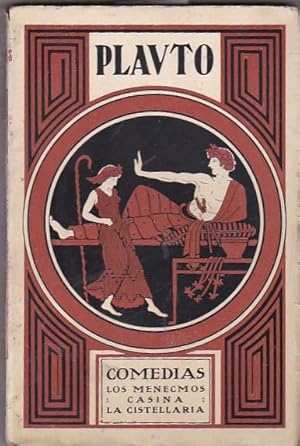Plautus Cistellaria
Cistellaria The Casket Comedy Plot Summary A young man from Lemnos raped a girl from Sicyon; he returned to his own country, married, and had a daughter. The girl from Sicyon also gave birth to a daughter. A slave took the daughter and abandoned her, and observed in hiding what happened.
Plautus Cistellaria
Fontaine: Plautus, Cistellaria ed. Stockert 499 landi, R. Ferri, eds., Aspetti della scuola nel mondo romano: atti del convegno (Pisa, 5–6 dicembre 2006). Supplementi di Lexis 51 [Amsterdam 2008], 253–88); but this publication can hardly be considered widely accessible. In Plautus these men are Demaenetus (Asinaria), Philoxenus and Nicobulus (Bacchides), Demipho (Cistellaria), Lysidamus (Casina), Demipho (Mercator), and Antipho (Stichus). Periplectomenos ( Miles Gloriosus ) and Daemones ( Rudens ) are regarded as senes lepidi because they usually keep their feelings within a respectable limit. This second volume of a new Loeb edition of all twenty-one of Plautus’s extant comedies presents Casina, Cistellaria, Curculio, Epidicus, and Menaechmi with freshly edited texts, lively modern translations, introductions. The Casket Comedy. The Two Menaechmuses. Plautus Cistellaria Argvmentvm C omprimit adulescens Lemnius Sicyoniam; I s redit in patriam et gnatam generat nuptiis. S icyonia aeque parit puellam. Hanc seruolus T ulit atque exponit, et ex insidiis aucupat. 5 E am sublatam meretrix alii detulit. L emno post rediens ducit quam compresserat L emnique natam spondet adulescentulo A more capto.
A prostitute picked her up and took her to another prostitute. 5 The man later returned from Lemnos and married the woman he had raped; he betroths his daughter born in Lemnos to a young man who is deeply in love with that foundling girl. In the course of his search the slave finds the girl he had exposed. 10 And so, when she is recognized as a citizen according to law and custom, Alcesimarchus retains the girl whom he had already taken.
Cistellaria Plautus Summeurry
Maccius, better known simply as Plautus (actually a nickname meaning ‘flatfoot’), was, between c. 205 and 184 BCE, a writer of comedy plays, specifically the fabulae palliatae, which had a -themed storyline. His plays are the earliest complete surviving works from Latin and they are noted for adding even more outrageous comedy to traditional comic plays. Plautus is also celebrated as a developer of characterisation and a master of verbal acrobatics. Finally, the plays are a rich and valuable source of information regarding contemporary Roman society. Biographical Details Details of Plautus’ life are sketchy and unreliable; even his name may be simply a collection of nicknames attributed to a particular playwright. Plautus is said to have been born in Sarsina, Umbria.
Ancient sources, now largely discredited as pure invention, tell of his early career in theatre when he worked as a stagehand, his bankruptcy from spurious business ventures, and his time working in a mill to make ends meet. Plautus’ Complete Works Twenty complete plays by Plautus survive along with around 100 lines of Vidularia (The Suitcase) and fragments from several others.

This body of work was first attributed to Plautus by the 1st century BCE Roman scholar Varro and the titles are: Early works: • Cistellaria (The Casket Comedy) • Miles Gloriosus (The Swaggering Soldier) • Stichus (200 BCE) • Pseudolus (191 BCE) Later works: • Bacchides (The Bacchis Sisters) • Casina • Persa (The Persian) • Trinummus (Threepence) • Truculentus (The Ferocious Fellow) Date/period unknown. • Amphitruo • Asinaria (The Comedy of Asses) • Aulularia (The Pot of ) • Captivi (The Prisoners) • Curculio (The Weevil) • Epidicus • Menaechmi (The Menaechmus Brothers) • Mercator (The Businessman) • Mostellaria (The Haunted House) • Poenulus (The Chappie) • Rudens (The Rope) Influences & Style These works are adaptations of 4th century BCE Greek New Comedy (and perhaps also Middle Comedy) plays with some Latin Comedy additions such as mime and bawdy jokes. The earlier Greek plays already had stock characters and Plautus freely expanded the roles of such staple characters as the cunning slave, the cook, and the parasite, giving them memorable character names into the bargain – for example, Chrysalus (Goldfinger) from Bacchides. Plautus frequently uses wordplay, alliteration and puns to deliver a series of devastating linguistical acrobatics. The plots of Plautus’ plays are also stretched to implausibility so as to heighten their comedy.